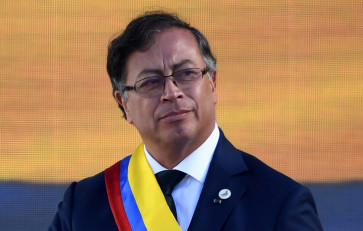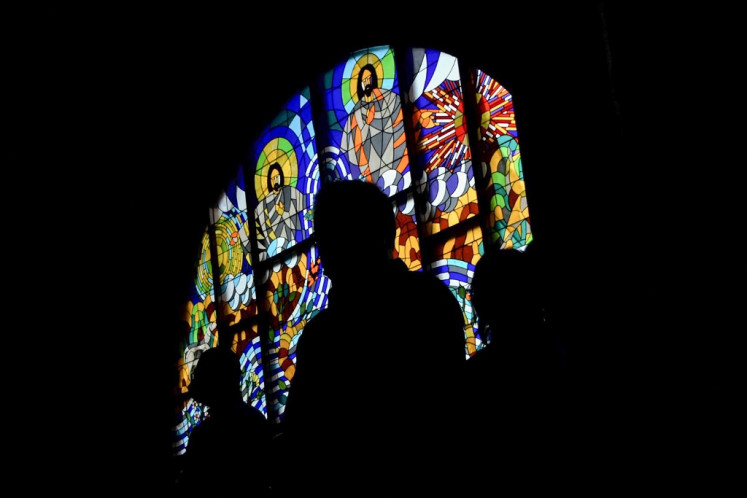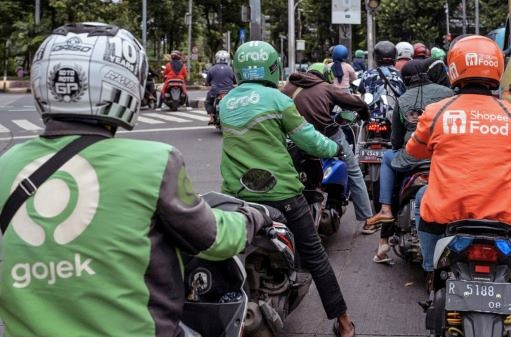Popular Reads
Top Results
Can't find what you're looking for?
View all search resultsPopular Reads
Top Results
Can't find what you're looking for?
View all search resultsPrabowo, SBY deal looking more likely
Old soldiers: President Susilo Bambang Yudhoyono (right) meets with chief patron of the Great Indonesia Movement Party (Gerindra), Prabowo Subianto, at his office in Jakarta on Monday
Change text size
Gift Premium Articles
to Anyone
O
span style="width: 510px;">Old soldiers: President Susilo Bambang Yudhoyono (right) meets with chief patron of the Great Indonesia Movement Party (Gerindra), Prabowo Subianto, at his office in Jakarta on Monday. The two former generals discussed the current political situation and a possible coalition. (Antara/Prasetyo Utomo)
The
widely publicized meeting between President Susilo Bambang Yudhoyono
and chief patron of the Great Indonesia Movement Party (Gerindra) Lt.
Gen. (ret.) Prabowo Subianto has led to speculation that the two have
struck a deal for a political alliance ahead of the 2014 presidential
election.
The meeting between Yudhoyono and Prabowo appeared to
have been stage-managed to get the widest media coverage possible, with
the schedule for the meeting being distributed hours before the meeting
took place.
Prabowo, who is a former commander of the Special
Forces Command (Kopassus) and a friend of Yudhoyono from his military
college days, was accompanied by Fadli Zon, his party’s deputy chairman.
According
to Fadli, the two discussed “substantial matters” which included
Yudhoyono’s latest trip to Europe and some domestic political and
economic issues.
Fadli however declined to give more details of
the meeting, especially on the issue of Prabowo’s presidential bid in
2014, saying that he was asked to leave the room when Yudhoyono and
Prabowo had a 20-minute closed-door private meeting.
Prior to the
meeting, Prabowo did not rule out the possibility that he and Yudhoyono
could talk about a potential alliance ahead of the 2014 election.
“Politics is dynamic. We’ll see,” he said.
After the meeting,
Prabowo also was tight-lipped over his presidential bid. He only
confirmed that he would run in 2014 but did not respond when asked about
forging an alliance with Yudhoyono’s Democratic Party. “The President
said in the meeting that anyone planning to run for president must be
down-to-earth and listen to the people’s wishes,” he said.
Presidential
spokesman Julian Aldrin Pasha said the media had read too much into the
meeting. “Both men are old friends. They have met numerous times in the
past,” Julian said.
Analysts, however, suspect that the meeting
was part of Yudhoyono’s “political survival” and “exit strategy”.
Because the Constitution prevents Yudhoyono from running for a third
term, it would be necessary for him to ensure that all scandals
implicating him or his family are swept under the rug when his tenure
ends in 2014.
And as his Democratic Party has not picked a
presidential candidate, the possibility of backing Prabowo’s candidacy
is now greater with his electability rating continuing to rise.
“SBY may see Prabowo as the most prospective ‘safe house’ after 2014,” Freedom Institute political analyst Yudi Latif said.
Several
politicians have been reportedly endorsed by Yudhoyono for the 2014
presidential election. They include State-Owned Enterprises Minister
Dahlan Iskan, Trade Minister Gita Wirjawan and Coordinating Political,
Legal and Security Affairs Minister Djoko Suyanto, all of whom are
regularly overshadowed by Prabowo in opinion polls.
Another
politician who is also believed to have been endorsed by Yudhoyono is
Coordinating Economic Minister Hatta Rajasa, who is chairman of the
National Mandate Party (PAN). But Hatta’s overtures to the People’s
Conscience Party (Hanura) chairman and former chief of the Indonesian
Military (TNI) Gen. (ret.) Wiranto has led many to speculate that the
two could prepare a presidential ticket for 2014.
The possible
alliance between Yudhoyono and Prabowo has concerned human rights
activists, who have long campaigned against Prabowo’s presidential bid.
Commission
for Missing Persons and Victims of Violence (Kontras) coordinator Haris
Azhar said Yudhoyono could have offered not to endorse efforts to
investigate the May 1998 human rights violation, which could implicate
the former Kopassus chief, as an incentive to Prabowo.
“It is
impossible for Yudhoyono not to be aware of Prabowo’s past record. In
politics, the calculation is easy; what will I get in return and what I
will give to you? In this sense, we are really concerned that
enforcement of human rights is being used as a political commodity,” he
said.
Opposition to a Yudhoyono-Prabowo pact also came from within Yudhoyono’s Democratic Party.
Young
politicians within the party including former rights activist Rachland
Nashidik and Ulil Abshar Abdalla said that part of the mission of the
party was to prevent Prabowo from becoming the country’s next president.










